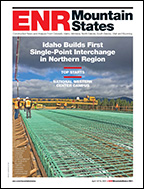Northern Colorado Report
“We did some sizable projects in 2009 in Northern Colorado, but I don't see that in 2010,” he says. “The trends I'm seeing in 2010 are based on the markets: biotech, clean tech and remodel work. With all of the vacancy rates, we are seeing a lot more people who want to upgrade their space.
“The other interesting part is that I would say 75% of our work is not traditionally funded by banks. Most of ours is state or federally funded, whether it’s schools, public hospitals, things like that. We are doing schools down south, in Alamosa and Sargents, which were funded through the BEST (Building Excellent Schools Today) program with some ties to federal funding.”
Speaking from a design perspective, George Brelig, principal with RB+B Architects in Fort Collins, says he believes many firms are hesitant to move ahead with construction until economic conditions improve.
“I think it’s going to be a year where we plan projects, perhaps do some design work, but I don't see too many people jumping beyond that and actually breaking ground,” Brelig says.
Besides bidding jobs outside the state, RB+B has found work through networking with consultants and even competitors, Brelig says. RB+B’s current project work includes the design of four schools in Boulder, Aurora and Erie, and school renovations in Niwot and Boulder, for a total estimated construction cost of $92.8 million. The two Aurora new school projects are a joint venture with Slaterpaull Architects of Denver.
Mark Latimer, president and CEO of the Associated Builders and Contractors Rocky Mountain Chapter, agrees that more companies are heading out of state to find work.
“In order to keep their backlog, we are seeing them bid on out-of-state jobs and travel out of state,” he says.
Economic casualties cost ABC some members in 2009, but Latimer says that the organization’s numbers are now on the rise.
“We have quite a few new member companies who are joining for networking and business-development opportunities,” he says. “Additionally, several new members have joined recently due to our lobbying efforts geared at protecting and supporting the construction industry.”
The economic downturn is reshaping the construction industry, Latimer adds.
“There will be a shakeout in the industry, and we will lose some companies,” he says. “But, hopefully, the ones that are strong will have found more efficient ways to deliver their construction projects—and in a greener manner, as well—so we are cautiously optimistic.”




